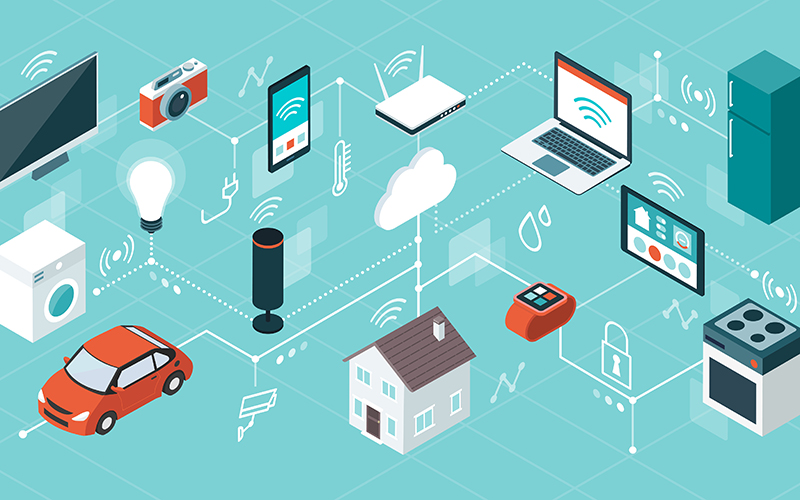The Internet of Things (IoT) is a rapidly advancing technology shaping our future. For university students, especially those in engineering and technology disciplines, understanding IoT is essential. This article explores the vast landscape of IoT, from its definition to its diverse applications, future prospects, and the burgeoning career opportunities it presents.
Understanding IoT
The Internet of Things connects everyday devices to the internet, allowing them to send and receive data. This interconnectedness transforms how systems and devices interact, leading to smarter and more efficient environments.
Applications of IoT
- Smart Homes and Consumer Electronics: Automating home environments for enhanced comfort, security, and energy efficiency.
- Healthcare: Wearable health monitors and smart hospital systems for improved patient care.
- Agriculture: Sensors for soil, weather, and crop monitoring to optimise farming practices.
- Industrial and Manufacturing: IoT in manufacturing leads to smarter supply chains and predictive maintenance.
- Smart Cities: Managing traffic, public services, and utilities through connected urban solutions.
The evolving landscape
The trajectory of IoT points towards greater integration with AI and machine learning, enhancing automation and data processing capabilities. This synergy is expected to foster intelligent systems capable of autonomous decision-making, propelling IoT’s influence across various sectors.
IoT career opportunities
An IoT Developer is at the forefront of designing and creating IoT devices and systems. They need to be adept in IoT-centric programming languages like Python, Java, and C++, as well as possess a sound understanding of microcontrollers, sensors, and networking. Their primary role involves developing the firmware and software for IoT devices, ensuring efficient connectivity and data collection capabilities.
In the realm of data, a Data Scientist or Analyst plays a critical role in extracting valuable insights from the massive amounts of data generated by IoT devices. These professionals utilise data analysis tools and statistical techniques to identify trends, perform predictive analysis, and provide actionable insights, making them integral to the decision-making process in various industries.
The IoT Solutions Architect oversees the creation of complete IoT solutions, ensuring they align with specific business requirements. This role requires a comprehensive understanding of IoT architecture and systems integration, as well as familiarity with various IoT platforms. They are responsible for designing scalable and secure IoT solutions.
With the expansion of IoT, the role of an IoT Security Specialist becomes increasingly crucial. These experts focus on the security aspects of IoT devices and networks, employing their knowledge of cybersecurity principles and network security to safeguard against potential threats.
Network Engineers or Architects are tasked with designing and managing the infrastructure that supports IoT. Their expertise in network design and management, coupled with an understanding of IoT communication protocols, ensures the establishment of robust and reliable networks essential for IoT systems.
Systems Integration Specialists ensure that various IoT systems function seamlessly together. They solve complex problems that arise from integrating multiple IoT systems, ensuring smooth interoperability and functionality.
The IoT Product Manager manages the entire lifecycle of an IoT product. Their role involves defining product requirements, overseeing development processes, and coordinating launch strategies, making them pivotal in bridging the gap between technical development and market needs.
User Experience (UX) Designers for IoT are responsible for creating user interfaces and experiences for IoT applications. Their work focuses on making IoT devices and applications intuitive and user-friendly, significantly impacting how end-users interact with IoT technologies.
Lastly, IoT Research and Development Engineers are involved in the innovation and development of new IoT technologies and applications. Their work often involves exploring uncharted territories in IoT, developing prototypes, and testing them for feasibility and practicality.
What this means
In conclusion, the Internet of Things (IoT) represents a transformative force in modern technology, with far-reaching implications for a multitude of sectors. Its rapid advancement demands a nuanced understanding, particularly for university students in engineering and technology disciplines. As IoT continues to evolve, integrating more closely with AI and machine learning, its applications are becoming increasingly sophisticated, leading to the creation of intelligent, autonomous systems.
The growth of IoT has opened a plethora of career opportunities, spanning from IoT development, data analysis, and systems architecture to specialised roles in security, network engineering, and systems integration. Each role plays a vital part in the IoT ecosystem, contributing to the development, analysis, security, and management of IoT solutions.
For students and professionals alike, IoT offers a dynamic and evolving field with the potential for innovation, problem-solving, and significant impact on both industry and daily life. As we move forward, the importance of IoT in shaping our technological landscape will only grow, making it an essential area of study and exploration for those aspiring to be at the forefront of technological advancement.
The understanding and skills gained in IoT today will not only prepare individuals for a diverse range of career paths but also equip them to contribute to the development of smarter, more efficient, and interconnected environments of tomorrow.




